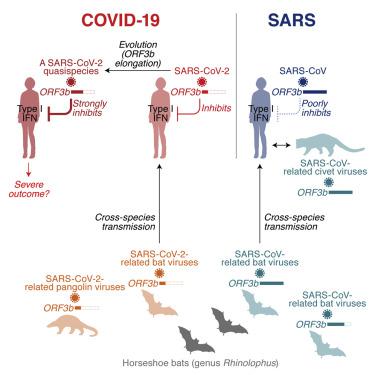Cell Reports ( IF 7.5 ) Pub Date : 2020-09-04 , DOI: 10.1016/j.celrep.2020.108185 Yoriyuki Konno 1 , Izumi Kimura 1 , Keiya Uriu 2 , Masaya Fukushi 3 , Takashi Irie 3 , Yoshio Koyanagi 4 , Daniel Sauter 5 , Robert J Gifford 6 , , So Nakagawa 7 , Kei Sato 1

|
One of the features distinguishing SARS-CoV-2 from its more pathogenic counterpart SARS-CoV is the presence of premature stop codons in its ORF3b gene. Here, we show that SARS-CoV-2 ORF3b is a potent interferon antagonist, suppressing the induction of type I interferon more efficiently than its SARS-CoV ortholog. Phylogenetic analyses and functional assays reveal that SARS-CoV-2-related viruses from bats and pangolins also encode truncated ORF3b gene products with strong anti-interferon activity. Furthermore, analyses of approximately 17,000 SARS-CoV-2 sequences identify a natural variant in which a longer ORF3b reading frame was reconstituted. This variant was isolated from two patients with severe disease and further increased the ability of ORF3b to suppress interferon induction. Thus, our findings not only help to explain the poor interferon response in COVID-19 patients but also describe the emergence of natural SARS-CoV-2 quasispecies with an extended ORF3b gene that may potentially affect COVID-19 pathogenesis.
中文翻译:

SARS-CoV-2 ORF3b是有效的干扰素拮抗剂,其活性因天然存在的延伸变体而增加。
SARS-CoV-2与致病性更强的SARS-CoV区别开来的特征之一是其ORF3b基因中存在过早的终止密码子。在这里,我们显示SARS-CoV-2 ORF3b是有效的干扰素拮抗剂,比其SARS-CoV直系同源物更有效地抑制I型干扰素的诱导。系统发育分析和功能分析表明,蝙蝠和穿山甲中的SARS-CoV-2相关病毒还编码具有强抗干扰素活性的ORF3b基因截短产物。此外,对大约17,000个SARS-CoV-2序列的分析确定了一个自然变异,其中较长的ORF3b阅读框被重新构造。从两名患有严重疾病的患者中分离出该变异体,并进一步提高了ORF3b抑制干扰素诱导的能力。因此,我们的发现不仅有助于解释COVID-19患者的不良干扰素反应,而且还描述了天然的SARS-CoV-2准种的出现,其带有可能会影响COVID-19发病机理的扩展ORF3b基因。







































 京公网安备 11010802027423号
京公网安备 11010802027423号